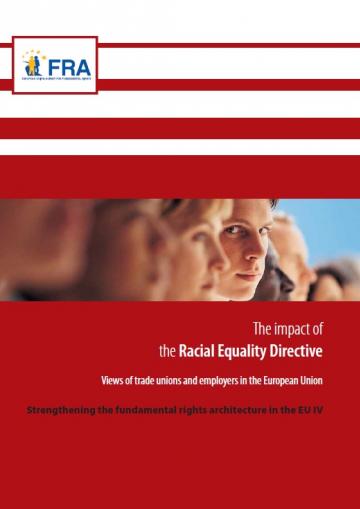
The impact of the Racial Equality Directive - Views of trade unions and employers in the European Union (Strengthening the fundamental rights architecture in the EU IV)
Background
The Racial Equality Directive was adopted in 2000 and had to be transposed into each Member State's national legislation by 2003 (slightly later for the Member States that joined the EU in 2004 and 2007). The Directive has been transposed into the national law of all Member States, although shortcomings in the transposition have been noted in some countries. The Directive invites the Fundamental Rights Agency (FRA) to contribute to the European Commission's reporting on its impact on the ground. This report is the first in a series of reports to be issued by the Fundamental Rights Agency in 2010 on the impact of the Directive.
Key findings
The Racial Equality Directive protects everyone in the EU
Respondents said that there was a common misconception among the public that the Racial Equality Directive gives protection only to migrant workers, while in reality it covers everyone in the European Union.
Trade unions and employers are encouraged to work together to combat racial and ethnic discrimination
Respondents viewed the EU as an important source of support for joint interventions between the social partners (trade union and employers' organisations), as well as for initiatives in individual workplaces and with civil society.
Race equality more difficult to sell than gender equality
Trade union respondents from France and Denmark said that activities to promote gender equality in the workplace are more accepted than activities to prevent racial discrimination.
Discrimination against the Roma often not seen as racial discrimination
Racial discrimination against the Roma was not acknowledged as such by many employer organisation and trade unions respondents.
Awareness levels of the Directive vary
Trade union respondents were generally more aware of the Directive than respondents from employers' organisations. Awareness levels of the Directive were generally higher among respondents from EU15 Member States than among those from most of the EU12.
Additional information
Disclaimer:
The research was compiled on the basis of individual country studies submitted by the members of the research consortium. The text of each of these country studies is available here. The country studies have not been edited or approved by the Fundamental Rights Agency. The country studies were drawn up in response to a questionnaire and should be read in conjunction with it. The individuals interviewed signed a release form in which they agreed to be quoted in the final publication.